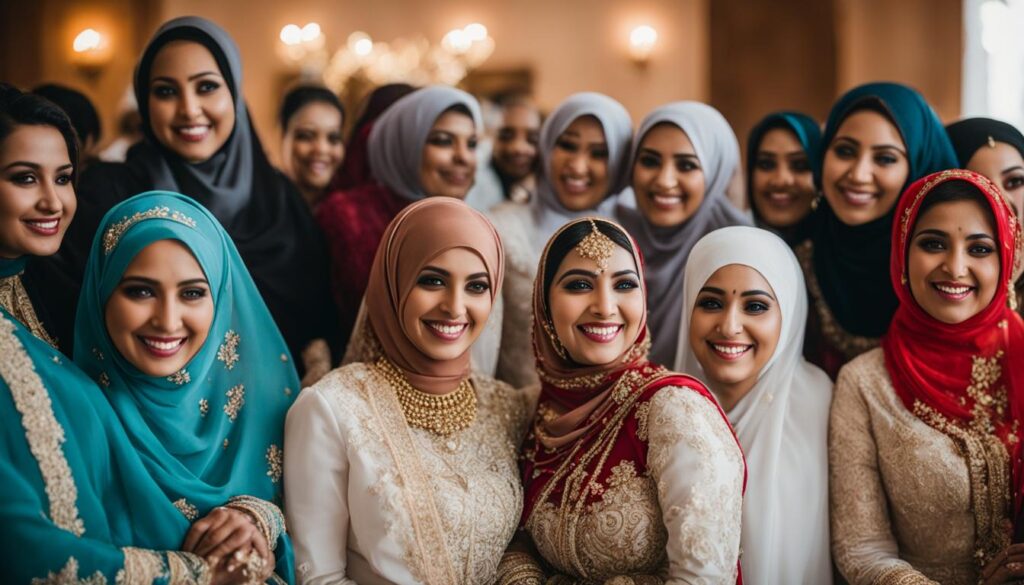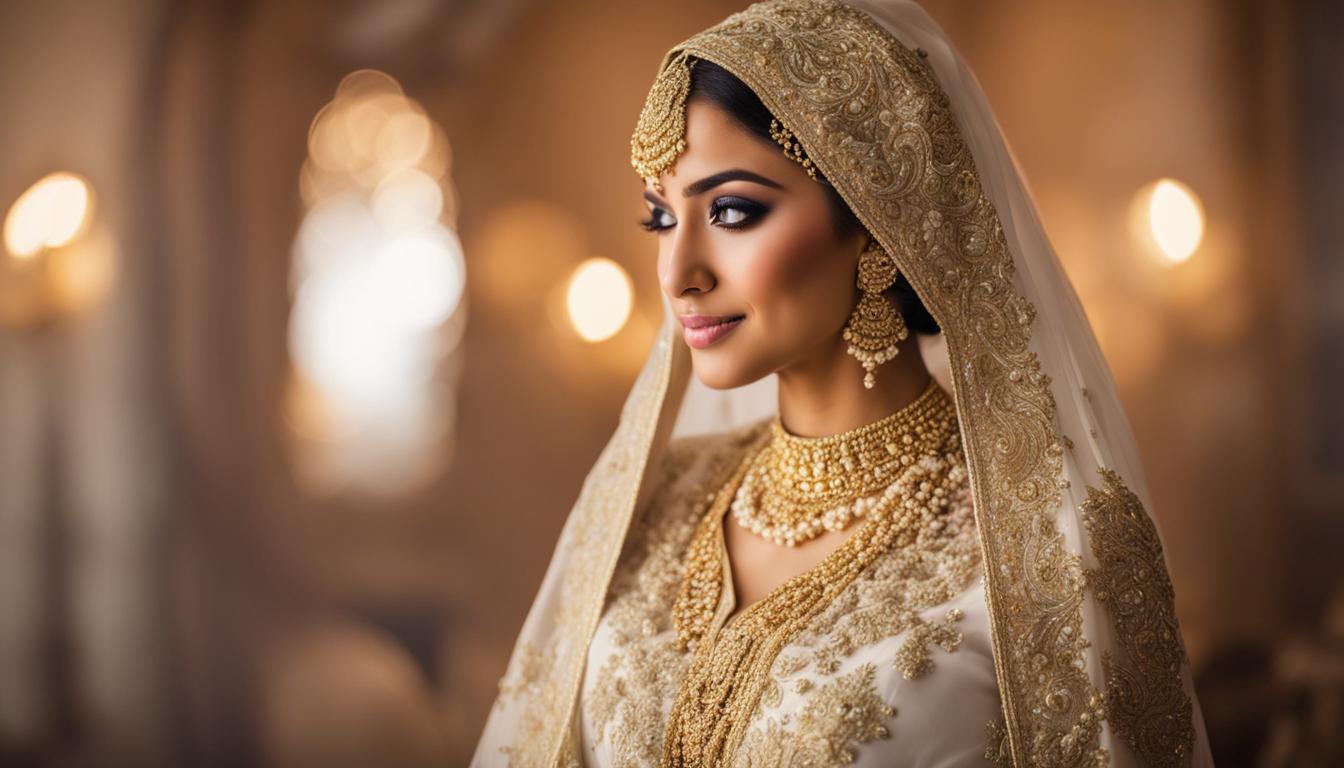Muslim brides exude timeless elegance on their wedding day, adorned in traditional Islamic wedding dresses that honor their cultural heritage and religious beliefs. These stunning ensembles, such as the hijab bridal dress, reflect the virtue of modesty while embracing the beauty of the occasion.
Steeped in history and tradition, Muslim bridal attire encompasses a range of styles and designs that captivate the eye and celebrate the rich aesthetics of the Muslim world. From exquisitely embroidered hijabs to flowing burqas, Muslim brides epitomize grace and beauty as they embark on this sacred journey.
In Western countries, Muslim brides have tastefully adapted their attire to strike a balance between tradition and contemporary style. With long sleeves, high necklines, and full-length skirts, their wedding gowns radiate elegance while honoring their faith. The modern Muslim bride embraces modest bridal wear that showcases her cultural identity and personal style.
Key Takeaways:
- Traditional Islamic wedding dresses embody the virtue of modesty and reflect the strongly held beliefs and aesthetics of the Muslim world.
- Muslim brides in Western countries adapt their attire to strike a balance between tradition and contemporary style, often opting for gowns with long sleeves, high necklines, and full-length skirts.
- Islamic wedding dresses serve as custodians of cultural and religious traditions, preserving the core values and aesthetics of the Muslim world.
- Female guests attending a Muslim wedding should dress modestly and respectfully, choosing attire that covers their arms, legs, and chest.
- Styling Muslim wedding attire involves combining traditional elements with personal style, embracing traditional fabrics, embellishments, and colors that reflect cultural identity and charm.
The Evolution of Muslim Wedding Fashion
Over time, Muslim wedding fashion has undergone a significant evolution to embrace a blend of tradition and modernity. As Muslim communities spread across the globe, traditional Islamic wedding attire has adapted to new environments while still upholding its core principles. In Western countries, Muslim brides have creatively fused traditional garments with contemporary styles, resulting in a diverse range of modern Muslim wedding attire. These fashion adaptations represent a cultural exchange where the dresses of the past are reimagined to suit the demands of the present.
Modern Muslim wedding attire for brides incorporates elements of Western design while staying true to Islamic customs. Brides now have a wide array of options, including intricately embellished gowns, saris, lehengas, and various other elegant designs. These choices reflect both cultural identity and current fashion trends, allowing Muslim brides to express their personal style while preserving their religious and cultural heritage.
Similarly, female guests attending Muslim weddings have also adapted their attire to align with the dress code guidelines while incorporating modern fashion trends. They can choose from modest yet fashionable options such as long abayas, loose-fitting gowns, and floor-length dresses with modest designs. By striking a balance between modesty and style, these modern Muslim wedding attire choices showcase the beauty of cultural diversity and embody the essence of the occasion.
Traditional Islamic Wedding Attire
Traditional Islamic wedding attire showcases the beauty of modesty and adheres to the cultural and religious values of the Muslim world. These dresses are crafted with care, using modest materials and incorporating intricate embroidery or delicate beadwork. The bride may wear a hijab or headscarf, symbolizing respect and modesty. These traditional dresses often feature long, flowing gowns or abayas, emphasizing elegance and grace.
Islamic wedding attire has a timeless appeal, preserving cultural heritage and religious values. The traditional Muslim wedding gown embodies the essence of modesty while exuding feminine charm. The carefully chosen fabrics, and the attention to detail in the design and construction, make these dresses truly unique and beautiful.
For Muslim brides, the traditional Islamic wedding attire is a symbol of their faith, tradition, and identity. It serves as a reminder of the cultural heritage and the importance of modesty, while allowing brides to feel beautiful and elegant on their special day.
Modern Muslim Wedding Attire for Female Guests
Attending a Muslim wedding as a female guest is an opportunity to showcase your style while respecting the cultural and religious traditions of the occasion. When selecting your outfit, it is important to choose appropriate Muslim wedding attire that reflects modesty and elegance. Opt for clothing that covers your arms, legs, and chest, such as long abayas or loose-fitting gowns, to adhere to the dress code guidelines. Remember to avoid wearing black, white, or red, as these colors may have cultural associations that divert attention from the bride.

Tips for Styling Muslim Wedding Attire
When it comes to styling Muslim wedding attire, striking a balance between tradition and personal style is key. By following a few simple tips, you can create a stunning and modest look that respects religious and cultural practices while still showcasing your unique taste.
Embrace Traditional Fabrics and Colors
One of the first things to consider when styling Muslim wedding attire is the choice of fabrics and colors. Opt for traditional fabrics like silk, chiffon, or velvet, as they not only lend an air of elegance but also hold cultural significance. Rich jewel tones, pastels, or earthy hues are popular choices that reflect cultural identity and charm.
Focus on Modest Silhouettes
Modest silhouettes are a cornerstone of Muslim wedding attire. Consider long gowns, saris, or lehengas that provide full coverage while still allowing for movement and comfort. Look for flowing skirts, high necklines, and long sleeves to maintain modesty without compromising on style.
Add Statement Accessories
Accessories can elevate your Muslim wedding attire and add a touch of personal flair. Opt for statement jewelry pieces, such as bold earrings or intricate necklaces, that complement your outfit without overpowering it. Consider incorporating traditional accessories like bangles or maang tikka for an authentic touch.
Remember, the goal is to create a polished and modest look that showcases your personal style while respecting the religious and cultural traditions associated with the event. By incorporating these tips into your styling choices, you can ensure that you feel confident, beautiful, and culturally appropriate at any Muslim wedding.
Conclusion
The beauty and significance of Muslim weddings lie not only in the celebration of love and faith but also in the preservation of cultural traditions. Muslim brides and female guests alike embrace the values of modesty, elegance, and respect for religious beliefs through their attire choices. Traditional Islamic wedding dresses have gracefully evolved over time, incorporating modern elements while staying true to their roots.
By donning modest and tasteful clothing, Muslim brides honor their cultural heritage and religious customs on their special day. Furthermore, female guests attending Muslim weddings play a crucial role in maintaining the harmony of the event by adhering to the dress code guidelines. Choosing attire that covers the arms, legs, and chest appropriately, along with opting for muted and celebratory colors, exemplifies respect for the occasion.
As we conclude, it is evident that Muslim weddings are not only a celebration of love but also a testament to the rich cultural tapestry that Islamic traditions offer. The attire worn by the bride and female guests reflects the values and aesthetics deeply ingrained in Muslim culture. By understanding and respecting these dress code guidelines, guests contribute to the overall ambiance of the ceremony, making it a truly memorable and cherished experience for all.
FAQ
What do Muslim brides wear?
Muslim brides typically wear traditional Islamic wedding dresses that embody the virtue of modesty. These dresses can include the hijab, niqab, and burqa, among others.
How has Muslim wedding fashion evolved over time?
Muslim wedding fashion has evolved to incorporate a balance between tradition and modernity. Traditional attire has adapted to new environments while remaining true to core principles, with Muslim brides infusing western design elements into their ensembles.
What does traditional Islamic wedding attire include?
Traditional Islamic wedding attire often includes long, flowy gowns or abayas that symbolize modesty. The bride may also wear a hijab or headscarf, which is a sign of respect and modesty. These dresses are typically made from modest materials and may feature intricate embroidery or beadwork.
What should female guests wear to a Muslim wedding?
Female guests attending a Muslim wedding are expected to dress modestly and respectfully. They should choose attire that covers their arms, legs, and chest and opt for conservative and elegant clothing choices.
What are the dress code recommendations for female guests at a Muslim wedding?
Female guests should adhere to a conservative and modest dress code when attending a Muslim wedding. This includes choosing clothing that covers their arms, legs, and chest appropriately. It is important to avoid wearing black, white, or red and instead opt for colors that align with celebratory occasions, such as navy, mint, and light shades. Adding a headscarf or hijab to the outfit is also recommended to show respect for cultural and religious traditions.
How should Muslim wedding attire be styled?
When styling Muslim wedding attire, it is recommended to combine traditional elements with personal style. Choose modest and tasteful clothing that adheres to the dress code recommendations and reflects cultural identity and charm. Women attending Muslim weddings should aim for a polished and modest appearance that respects religious and cultural traditions.
What is the significance of Muslim wedding attire?
Muslim wedding attire serves as custodians of cultural and religious traditions, playing a significant role in preserving the core values and aesthetics of the Muslim world. It represents the values of modesty, elegance, and respect for religious beliefs.

